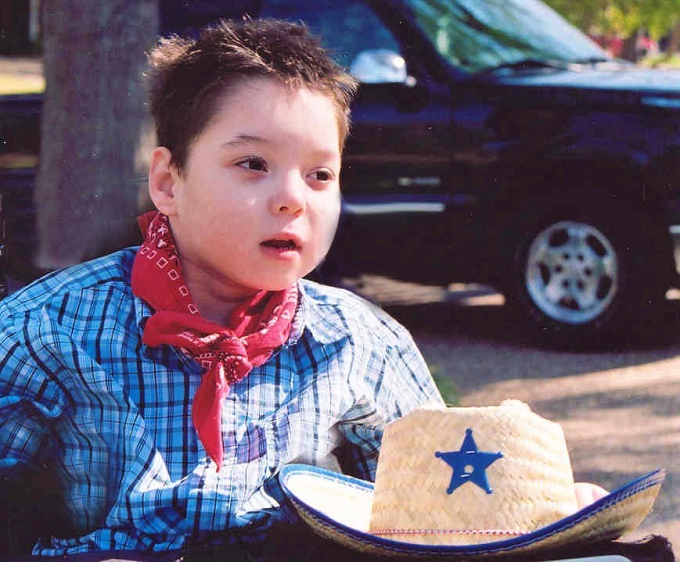McLaughlin gift strengthens field of pediatric neurology
By Erin Prather Stafford
The year was 2000, and David and Luzona McLaughlin were desperately in search of answers about their son, Grant, who began suffering from seizures just two months after birth. After multiple hospitalizations, Grant was eventually diagnosed with infantile spasms, a catastrophic type of epilepsy.

Grant McLaughlin
Epilepsy is a neurological condition that causes a person’s neurons to fire unexpectedly, which can lead to harmful seizures. Grant’s epilepsy was idiopathic, meaning that neurologists and specialists could not identify its cause. Several times a week he would go into status epilepticus – when seizures last over five minutes or are so close together someone cannot recover between them. Because of these horrific seizures, Grant required 24/7 nursing care.
“I describe Grant’s condition as his brain was a television without reception, full of constant static,” said Mrs. McLaughlin. “He suffered from hundreds of seizures a day.”
Grant passed away in 2007, and since then, the McLaughlins have been working towards a more hopeful future for children like their beloved son. They stated, “Our number one priority was to always provide Grant with the best quality of life possible. We have strived to maintain his legacy and make outcomes better for children suffering from epilepsy and other neurological diseases.”
Preparing the next generation of pediatric neurologists
Partnering with Pediatric Epilepsy Research Foundation (PERF), the couple made a $10,000 gift to establish the William Grant McLaughlin Pediatric Neurology Education Fund at UT Southwestern Medical Center to support medical students specializing in pediatric neurology.
According to both the American Academy of Neurology and the Child Neurology Society, a national shortage of pediatric neurologists has reached a crisis level. To increase the number of trained pediatric neurologists, the Division of Child Neurology at UT Southwestern has made it a priority to educate the next generation of these physicians. Mr. and Mrs. McLaughlin became aware of the physician shortage due to their involvement with PERF.
PERF’s primary focus is to support research in pediatric epilepsy and other pediatric neurologic conditions. In 2010, Mr. McLaughlin was elected to the PERF Board of Directors, a position he held until 2017.
“Our goal for this gift is to inspire talented medical students and encourage them to specialize in pediatric neurology,” said Mr. McLaughlin. “Luzona and I are both aware of the reputation UT Southwestern has, and we understand the important role it can play regarding pediatric epilepsy.”
The Division of Child Neurology at UT Southwestern is part of the Peter O’Donnell Jr. Brain Institute and offers comprehensive diagnosis and management for children from newborn to late adolescence at Children’s Medical Center who have disorders of the brain, spinal cord, nerve, or muscles. Faculty also conduct a variety of neurologic research and clinical studies, including clinical trials focused in anti-epileptic drugs. In addition, the promise of gene therapy to correct mutated genes that disrupt healthy development brings hope to children with epilepsy.
“Much more than any other field of medicine, pediatric neurology is wholly transformed by the genomic revolution, and the critical shortage in pediatric neurologists is occurring within this time of great change,” said Berge Minassian, chief of Child Neurology. “More so than any other specialty, we are now able to exactly specify the causative defect in most children with brain disease. Even more importantly, we are able to use this knowledge to treat our patients. This gift is helping us make a difference locally, helping attract medical students to this exciting time of change towards being able not only to diagnose but treat our kids suffering from diseases of the brain.”
Advocating for change
In addition to their gift to the UT Southwestern, Mr. and Mrs. McLaughlin have been active in keeping Grant’s memory alive. Each year on their son’s birthday, the couple donates teddy bears, which have become known as “Grant Bears,” to the medical center where Grant was hospitalized many times throughout his life. They participated in U.S. Food and Drug Administration hearings for new epilepsy drug approval and were involved multiple years raising funds for the Epilepsy Foundation Texas in the Stroll for Epilepsy.
In the earlier years following Grant’s neurological diagnosis, Mrs. McLaughlin designed several sensory and special-needs toys, one of which is sold in the Abilitations School Specialty, a catalog that sells special education resources to educators.
To ensure that Grant had the best possible learning environment, Mr. and Mrs. Mclaughlin also worked closely with the Plano Independent School District (PISD) to promote active learning for profoundly impaired children. As Grant’s advocates, his parents collaborated with PISD to allow medical nurses to attend school with critically ill and impaired children. As a result, Grant was the first child in PISD to attend school with a medical nurse. PISD also developed processes facilitating attendance for medically fragile children. Additionally, the Special Education Program (SEP) incorporated many of Mrs. McLaughlin’s sensory ideas, which today are still in use by therapists and the SEP across PISD.
Today a tree stands at Grant’s school, Pearson Early Childhood School, and is adorned with a placard in honor of Grant’s memory and his impact on PISD.
“We are both so fortunate and blessed to be Grant’s parents,” said Mrs. McLaughlin. ”At school Grant really loved interacting with other children and his teachers. We believe it makes him happy knowing David and I are attempting to make a difference, making a better future for other children.”
Facts about epilepsy
- Epilepsy is a disorder in the brain that causes seizures.
- Epilepsy can be caused by strokes, brain tumors, or head injuries; but many times the reason is unknown.
- An estimated 750,000 children (up to age 17) have epilepsy or a seizure disorder; of that number, 460,000 children have active epilepsy.
SOURCE: CENTERS FOR DISEASE CONTROL AND PREVENTION |
To learn more about how you can support epilepsy research at UT Southwestern, contact the Office of Development and Alumni Relations by Email or phone at 214-648-2344.